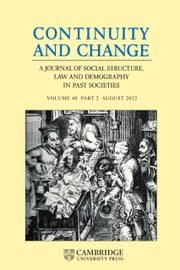Article contents
Soviet urban households and the road to universal employment, from the end of the 1930s to the end of the 1960s
Published online by Cambridge University Press: 17 February 2006
Abstract
The author studies patterns of income-earning activities of Soviet urban households from the end of 1930s to the end of 1960s. The analysis focuses on the dynamic of and reasons for the increases in the labour participation rate of the Soviet urban population, and in the proportion of households in which two members were employed by the state, and the consequences. The period saw two mass drives to recruit into the state sector adults who had previously been unemployed, the bulk of whom consisted of former housewives, the first drive occurring during the Second World War and the second in the late 1950s and the 1960s. The combined pressures exerted by the law and by material hardship account for the wartime increase in participation in the labour market. On the other hand, the second period of major expansion was much more voluntary and was accompanied by improved living standards. Despite the increase in remunerated employment there were no significant changes in the way tasks within the household were allocated on the basis of gender. This put an increasing strain on women, called the ‘double burden’ (household duties and paid work). The consequences were twofold: a decrease in fertility, and further encouragement for the formation of the many extended and multiple family households present in the urban society of the USSR.
- Type
- Special Issue (Part I)
- Information
- Copyright
- © 2005 Cambridge University Press
- 3
- Cited by


